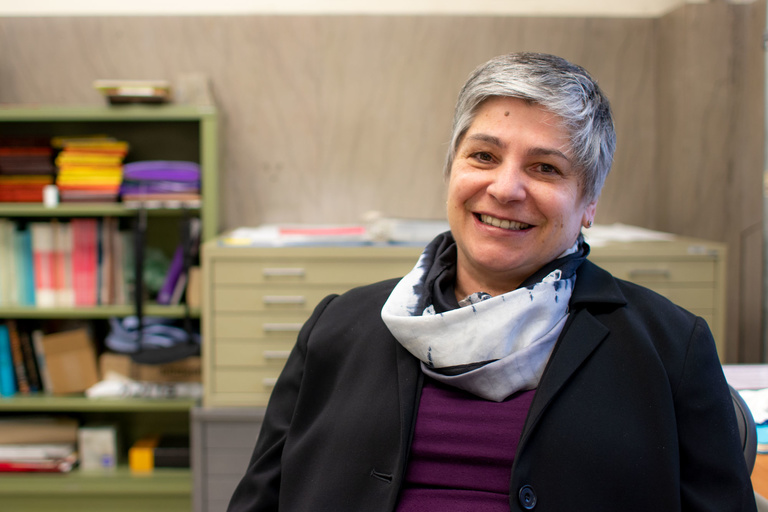
Earth and Environmental Sciences Professor Jane Gilotti poses for a photo in her office at Trowbridge Hall
The University of Iowa is thrilled to announce that Jane Gilotti, professor in earth and environmental sciences at the University of Iowa, has been selected as a Fulbright Scholar to Poland for the 2020-21 academic year.
Gilotti is one of more than 800 U.S. citizens who will teach, conduct research, or provide expertise abroad for the 2020-2021 academic year through the Fulbright U.S. Scholar Program. Recipients of Fulbright awards are selected based on academic and professional achievement as well as a record of service and demonstrated leadership in their respective fields.
Gilotti's research in Poland will involve understanding the architecture of mountain belts by collecting data from deeply buried rocks and studying the exhumed bits of ancient plate collisions.
I am grateful for the opportunity to realize J. William Fulbright’s vision for this truly global exchange program and expect to return to the University of Iowa feeling revitalized.
"In 1990 while on a mapping expedition with the Geological Survey of Greenland, I discovered a very large area of high-pressure rocks, called eclogites, in the continental crust of North-East Greenland," said Gilotti. "Before the opening of the Atlantic Ocean, Greenland occupied the upper plate of the Caledonian collision with Scandinavia, in much the same way that Asia overlies India in the modern Himalayan orogen. The eclogite province in North-East Greenland is analogous to rocks currently located at 50–80 km beneath the Tibetan Plateau, formed by over thickening of the crust due to contraction. My Fulbright project will focus on the question of how and when did the eclogite province make its way back to Earth’s surface? We will use my existing rock collection to study the mineral assemblages and chemistry to gain an understanding of the temperature and depth path the rocks followed back to the surface. Our results will help us build models of both the formation and exhumation of ancient mountain systems."
Pulling from her experience over the years working with students to provide real-world, hands-on learning, Gilotti will offer a graduate student workshop on microstructural analysis during her Fulbright visit to Poland and share her collection of over 500 rock samples with a recent post-doc and Polish colleague, Karolina Kosminska, using the collection as a basis for new projects.
Given the global nature of Gilotti's area of study, international research and collaborations are essential to anyone working in the field of earth and environmental science.
"Belonging to an international community of scholars with shared interests has been a very rewarding aspect of my career," said Gilotti. "The 'eclogite community' meets every other summer to go on field trips and discuss progress in our discipline. It is a very welcoming group that celebrates the joy of basic discovery. International collaboration is an essential element of Arctic research because single investigators cannot afford the expensive logistical costs of fieldwork in these remote regions. The Fulbright project will reinvigorate my research on the high-pressure rocks of North-East Greenland."
In addition to her research and teaching, Gilotti hopes to continue to foster exchanges of students and data between her research groups and countries, ultimately organizing future fieldwork in North-East Greenland.
"Living abroad brings new experiences, friendships, surprises and challenges that just don’t present themselves in everyday life in Iowa City. I truly enjoy immersing myself in a different culture. I find that being in a different space is conducive to new ideas and problem-solving. Time suddenly materializes for deep thinking and writing. I am grateful for the opportunity to realize J. William Fulbright’s vision for this truly global exchange program and expect to return to the University of Iowa feeling revitalized."
University faculty members at all stages of their careers can apply to become Fulbright Scholars. Grant recipients can teach, do research abroad, or a combination of both for time periods ranging from 2-6 weeks up to a semester or entire year.
Learn more about the UI resources for applying to the Fulbright Scholar Program!